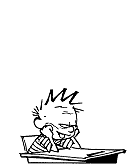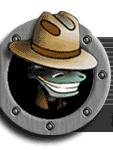 Exams
Exams
For many
of us, exams have a bad feeling attached. Please see exams as an opportunity
in this course. We will consistently use exams as a way to show competency,
to increase awareness of strengths and weaknesses in specific areas and
as check points.
In the recent
past, educators expanded the meaning of test or exam to include many formats
for proving expertise. In this course, exams are tied to your learning
style and preference. In this course, they are also tied to your own creativity.
You may prefer
to take a multiple choice test, but if you are more of a kinesthetic learner,
you may want to do a video stream of a dialogue. The course suggests that
you develop an array of preventive, supportive and corrective self and
student management tools. As a final, you build a personal discipline
plan that explores how you will facilitate order, learning and relationship
as a teacher. If you already have classroom experience, you may want to
develop a handbook for parents to help them understand the discipline
process as your exam. That would be an excellent challenge, a way to "strut"
your learning in this class, reflect on current practices and enhance
relationship with parents. It is a fine alternative to the suggested exam.
The idea
here is to match your level of comfort and the State and NAU desire and
dedication to provide you with enough rigor and proof to yourself and
certification entities, that learning is occurring.
So --- exams
are tests of the course, the professor, the textbooks suggested and a
test of your ability to learn. It is evidence that you expended the effort.
In once sense it is a hoop contest - can you or can't you? And it is a
hoop contest for us, too. Did we teach you well? show you how to learn
the material, provide practice, the big "MO"
(motivation), make it clear what was expected? And then there is the other
layer -- do others in the field - parents, administrators, future students,
certification entities - and the Teacher Exam scores -- get a sense that
you learned, too?
This is a
very important construct. Not only does it apply to you in this course,
it is the model for you and your teaching as a special educator. You want
to learn to keep a series of things spinning all at once - student ability,
challenge, learning style -- and you want the tests you use to show expertise,
to point out strengths and weaknesses without embarrassing you or the
student
|
Rigor
+ compassion + the big "MO" + accuracy in assessment
+ learning strengths + level of expertise + ?
|
.
WOW! Doing
a good job of assessment is tough!
Remember.
In this course, you may suggest ways to show your expertise, or you can
take the exams that are available on line - One exam comes right after
you complete the Behavior Portal and knowledge of Behavior Modification
techniques. The second test comes at the conclusion of the course, though
you can access it all through the course. It is in the Reflection and
Enlightenment room.
Can you work
open book on exams? Absolutely. Can you discuss the material with the
teacher if you get stumped? Absolutely. What about talking with other
students on-line? Absolutely.
Exam?
Why not reformulate what it means to you and
how to help students see them positively as you approach your test making
days?
You
may see the exams now by clicking on this link. Want to print it out and
get started at the beginning of the course? Great idea!
|






